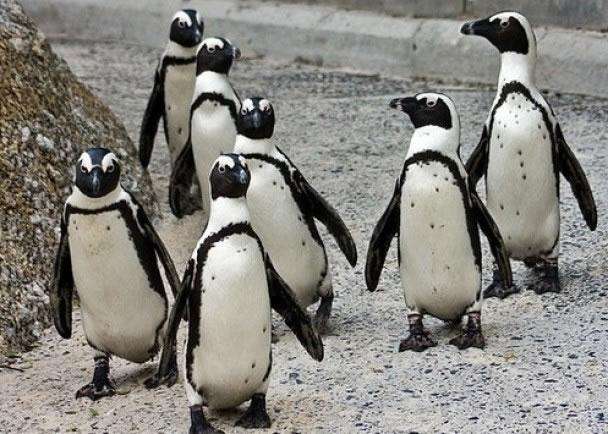(单词翻译:单击)
听力文本
This is Scientific American — 60-Second Science. I'm Jason Goldman.
Over millions of years, penguins have evolved a keen sense of where to find food. Once they're old enough, they set off from the shores on which they hatched for the first time and swim long distances in search of tasty fish like anchovies and sardines. But they don't search directly for the fish themselves.
For example, when young endangered African penguins head out to sea, they look for areas with low surface temperatures and high chlorophyll. Because those conditions signal the presence of phytoplankton. And lots of phytoplankton means lots of zooplankton, which in turn means lots of their favorite fish. Well, that's what it used to mean.
Climate change plus overfishing have made the penguin feeding grounds a mirage. The habitat is indeed plankton-rich—but now it's fish-poor. Researchers call this kind of scenario an "ecological trap."
"It's a situation where you have a signal that previously pointed an animal towards good quality habitat. That habitat's been changed, usually by rapidly induced human pressures, usually anthropogenic change—and the signal stays, but the underlying quality in the environment deteriorates."

University of Exeter zoologist Richard Sherley. He and his team used satellite imaging to track the dispersal of 54 recently fledged African penguins from eight sites along southern Africa. Historically, the birds benefitted from tons of fish off the coasts of Angola, Namibia and western South Africa, but now they're going hungry.
"I was really hoping we'd see them going east, and finding areas where the fish had shifted to...so I was quite surprised to be wrong, and unfortunately quite sad to be wrong in this case. It ends up being quite a sad story for the penguins."
The researchers calculate that by falling into this ecological trap, African penguin populations on South Africa's Western Cape have declined by around 80 percent. The findings are in the journal Current Biology.
Some research groups are exploring the idea of translocating chicks to a place where they can't get trapped, like the Eastern Cape. But Sherley thinks that a longer-term solution means implementing regulations to create more sustainable fisheries, something that he says has public support.
And as for the penguins?
"There's not necessarily yet in an extinction vortex. So it's not hopeless yet."
But time flies. Unlike penguins.
Thanks for listening for Scientific American — 60-Second Science Science. I'm Jason Goldman.
参考译文
这里是科学美国人——60秒科学。我是杰森·古德曼。
企鹅用数百万年进化出了寻找食物的敏锐嗅觉。一旦企鹅长到足够大,它们就会离开孕育它们的海岸,游很长的距离去寻找凤尾鱼、沙丁鱼等美味的鱼类。但是,它们并不是直接去寻找鱼。
举例来说,当年轻的濒危非洲企鹅游向大海时,它们在寻找表面温度低而且叶绿素含量高的地方。因为这些条件预示着浮游植物的存在。浮游植物丰富意味着浮游动物多,这继而表明它们爱吃的鱼类也很多。可是这只是以前的情况。
气候变化和过度捕捞使企鹅的觅食区变成了海市蜃楼。这里的浮游植物的确很丰富,可是鱼类的数量却很贫乏。研究人员将这种情况称为“生态陷阱”。
“这种情况传递出了一个信号,这个信号此前将动物引向了优质的栖息地。但是,迅速产生的人为压力改变了这个栖息地,这种改变通常是人为改变,虽然信号依然存在,但是该环境的潜在质量已经恶化。”
理查德·谢利是埃克塞特大学的动物学家。他和他的团队用卫星成像追踪非洲南部八个地点54只近期成熟企鹅的分布情况。从历史上看,企鹅在安哥拉、纳米比亚和南非西部海岸捕食鱼类为生,但是现在企鹅要挨饿了。
“我真的希望可以看见它们向东走,然后找到鱼类已经转移到的地区……不幸的是,企鹅判断错误,我感到惊讶又悲伤。最终,这对企鹅来说是一个悲伤的故事。”
研究人员通过计算发现,由于陷入生态陷阱,南非西开普的非洲企鹅数量已经减少了约80%。这项研究结果发表在《当代生物学》期刊上。
一些研究小组正在考虑将企鹅幼崽转移到不会落入生态陷阱的地方,比如东开普省。但是谢利认为,更为长久的解决方案是要实施规定,创造更可持续的渔业,他说这需要公众支持。
那企鹅呢?
“企鹅还不至于陷入灭绝旋涡。所以,还是有希望的。”
但是时光飞逝。可不像企鹅似的。
谢谢大家收听科学美国人——60秒科学。我是杰森·古德曼。
译文为可可英语翻译,未经授权请勿转载!
重点讲解
重点讲解:
1. set off 动身;出发;启程;
例句:I propose to set off immediately.
我建议马上动身。
2. in turn 继而;转而;反过来;
例句:This, in turn, has generated current account surpluses.
这继而导致了经常账户盈余。
3. benefit from 获益;对…有益;有利于;
例句:You will benefit from experience.
你一定会从经验中获得益处。
4. end up 最终;结果;到头来;
例句:Concerted fiscal restraint could trigger another recession, but the lack of it could end up in bigger default risks.
各国协同施行财政紧缩,有可能引发新一轮衰退,但如果不这样做,最终可能加剧违约风险。


